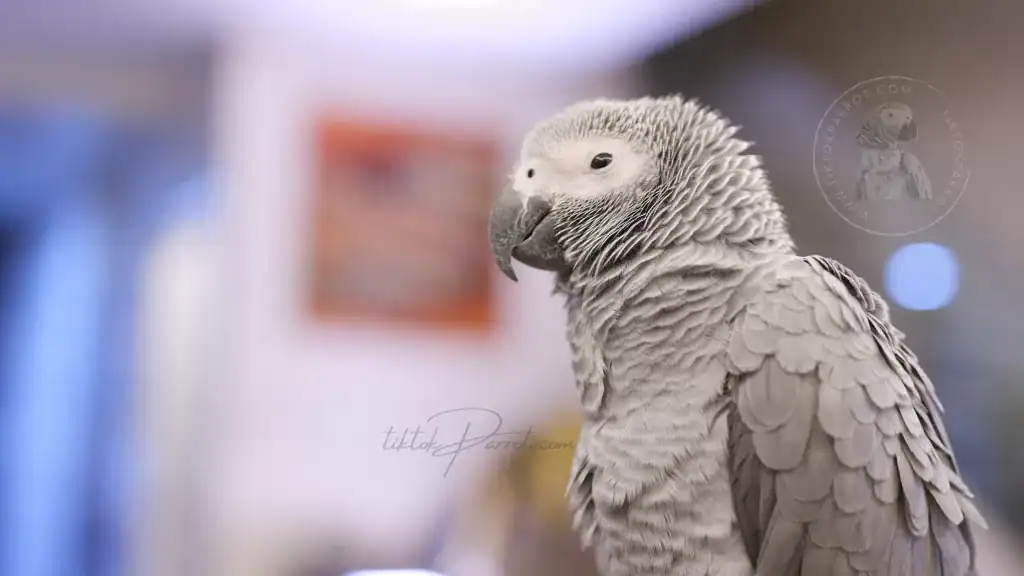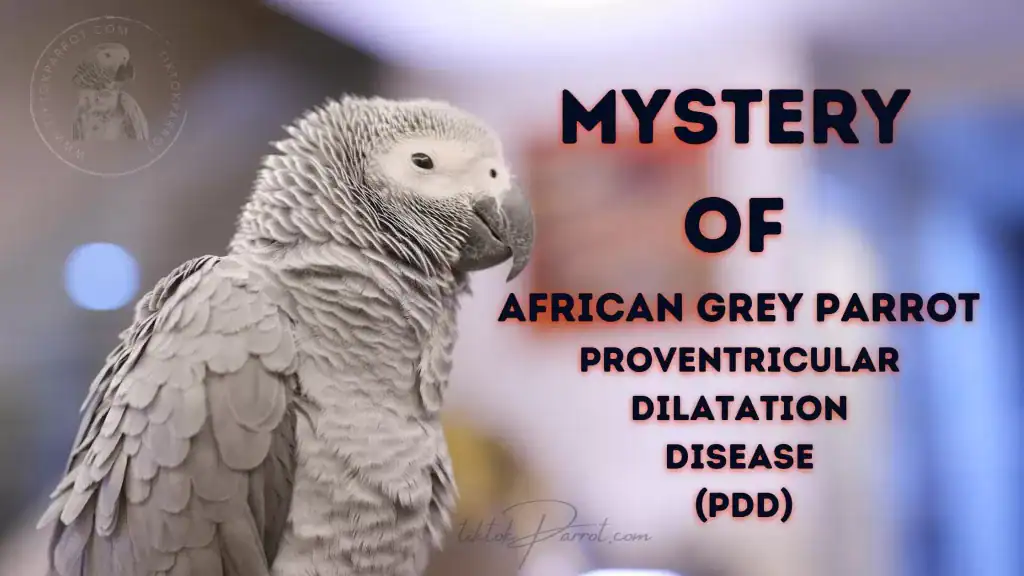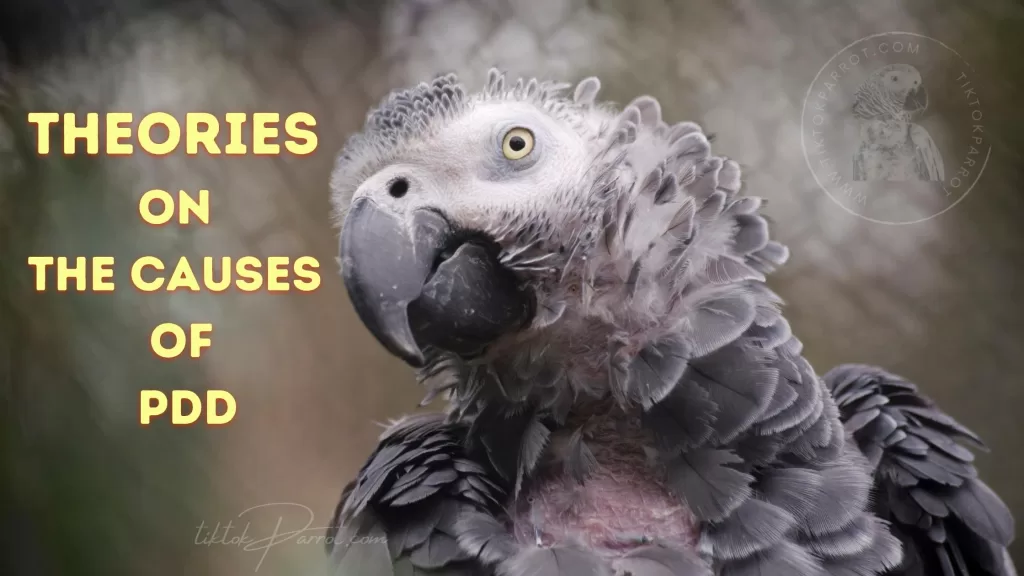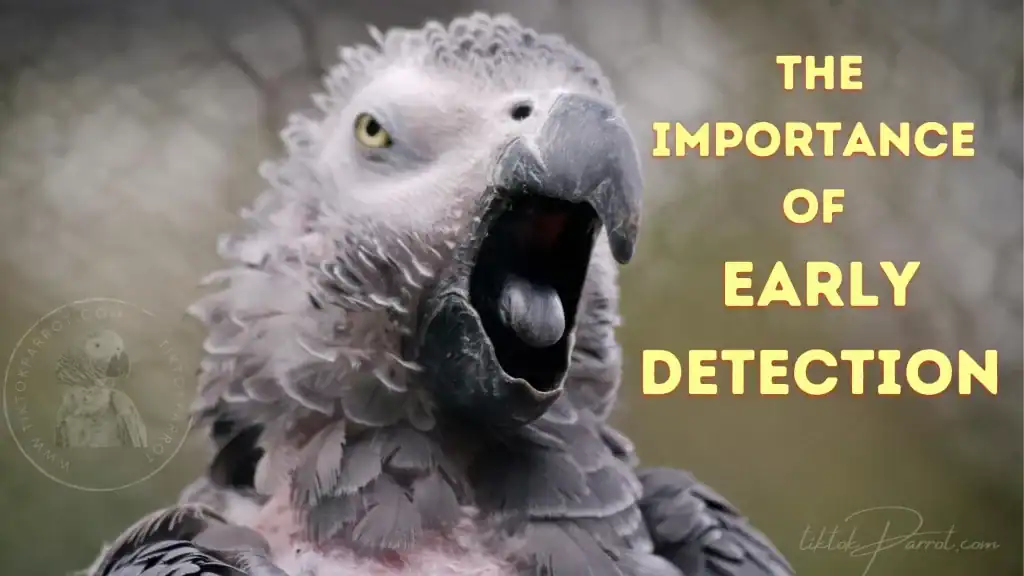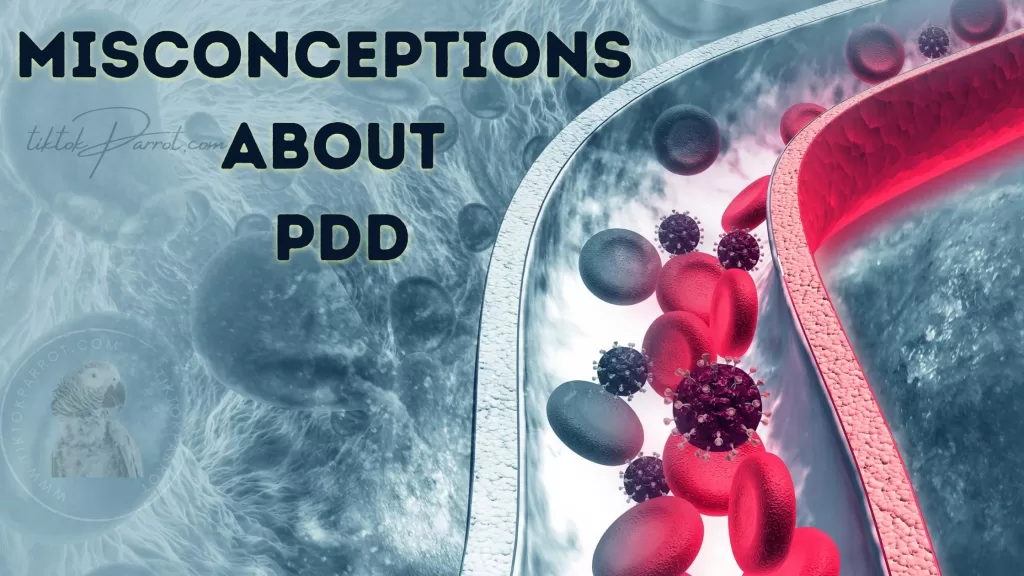African grey parrots are intelligent, social creatures that have captured the hearts of bird enthusiasts around the world. Known for their exceptional ability to mimic human speech and their affectionate personalities, African greys are beloved pets. However, despite their popularity, many grey owners are unaware of the serious health issue that threatens their feathered friends: Proventricular Dilatation Disease (PDD).
African grey parrot Proventricular Dilatation Disease (PDD) is a mysterious ailment that has puzzled avian experts for decades. Discover its symptoms, causes, and ways to keep your African Grey healthy and safe.
PDD is a devastating illness that affects the nervous system of grey parrots, causing a range of symptoms that can vary from bird to bird.
In some cases, the symptoms can be mild, while in others, they can be life-threatening. Despite years of research, the cause of PDD remains a mystery, making it a challenging disease to diagnose and treat.
In this comprehensive blog post, we will delve into the mysteries of PDD and explore what we know about this devastating illness. From the latest research on its causes to the latest treatments and therapies, this guide will provide you with the information you need to keep your african grey healthy and happy.
Understanding PDD
African Grey Parrots are known for their intelligence, social behavior, and the ability to mimic human speech, making them one of the most beloved pet birds in the world. However, despite their popularity, many grey owners are unaware of the serious health issue that threatens their feathered friends.
These magnificent creatures are prone to a mysterious ailment known as Proventricular Dilatation Disease (PDD). This debilitating condition has puzzled avian experts for decades, leaving many African Grey owners worried about their pets’ health.
What is PDD?
PDD is a progressive and debilitating disease that affects the nervous system of African Grey Parrots. It is characterized by the dilatation of the proventriculus, one of the digestive organs of the bird, which leads to a range of symptoms that can vary from bird to bird. In some cases, the symptoms of PDD are mild, but in others, they can be life-threatening.
It’s a neurodegenerative disease that affects the digestive system of birds, leading to a dilatation or swelling of the proventriculus (a part of the stomach). The disease can cause a wide range of symptoms, including weight loss, regurgitation, vomiting, and difficulty swallowing. In severe cases, it can lead to death.
The History of PDD
The first reports of PDD in African Grey Parrots were reported in the late 1980s. Since then, the disease has been recognized as a significant threat to the health of these birds and has been the subject of extensive research. Despite years of study, the exact cause of PDD remains unknown, making it a challenging disease to diagnose and treat.
The Symptoms of PDD
The symptoms of PDD can vary greatly from bird to bird, but some of the most common include:
- Regurgitation: African Greys with PDD often regurgitate their food soon after eating.
- Weight loss: As the disease progresses, the bird may lose weight and become emaciated.
- Weakness: African Greys with PDD may become weak and lethargic, struggling to fly or climb.
- Difficulty swallowing: The bird may have difficulty swallowing food, leading to malnutrition.
- Neuropathic symptoms: African Greys with PDD may exhibit neuropathic symptoms, such as tremors or convulsions.
Theories on the Causes of PDD
African grey parrots are prone to a serious and debilitating disease called Proventricular Dilatation Disease (PDD). Despite years of research, the exact cause of PDD remains unknown. However, several theories have been proposed, including:
- Virus: One of the most widely accepted theories is that PDD is caused by a virus. This theory is supported by the fact that PDD has been observed in African Grey Parrots that have been close to each other, suggesting that it may be contagious. Some experts believe that the virus may be similar to a human virus, such as a neurotropic virus.
- Environmental factors: Another theory is that PDD is caused by environmental factors, such as exposure to toxins and pollutants, such as pesticides and heavy metals. African Grey Parrots are known to be sensitive to these substances, and exposure to them may be damaging to the bird’s nervous system.
- Malnutrition: Malnutrition and an imbalanced diet have also been linked to PDD. African Grey Parrots require a balanced diet that includes all of the necessary nutrients, and a diet that is deficient in these nutrients may put the bird at risk for PDD.
- Genetic predisposition: Some experts believe that PDD may be caused by a genetic predisposition. This theory is supported by the fact that some African Grey Parrots seem to be more susceptible to PDD than others.
- Other factors: Other factors that may be contributing to PDD include stress, aging, and underlying health issues.
The exact cause of PDD is still unknown, but it’s believed to be caused by a combination of factors, including viral infections, exposure to toxins, genetic predisposition, and stress.
Despite extensive research, the exact cause of PDD in grey parrots remains unknown. However, by understanding the theories about the causes of PDD, pet owners can take steps to minimize the risk of their birds developing this disease. This includes providing a balanced diet, minimizing exposure to environmental toxins, and reducing stress in the bird’s environment.
The Link between PDD and Malnutrition
Malnutrition is one of the theories that has been linked to the development of Proventricular Dilatation Disease (PDD) in African Grey Parrots. This theory is based on the idea that a deficient or imbalanced diet can weaken the bird’s immune system, making it more susceptible to the disease.
African Grey Parrots are known to require a balanced diet that includes all of the necessary nutrients, such as protein, fat, carbohydrates, vitamins, and minerals. A diet that is lacking in any of these nutrients can lead to malnutrition and can cause a variety of health problems in the bird, including PDD.
Studies have shown that birds with PDD often have lower levels of certain vitamins and minerals, such as vitamin E and selenium, compared to healthy birds. This suggests that a deficiency in these nutrients may contribute to the development of PDD. Additionally, a diet that is high in fat and low in fiber has also been linked to PDD, as it can cause digestive problems and other health issues.
As I mentioned above while the exact cause of PDD in African Grey Parrots remains unknown, there is evidence to suggest that malnutrition may play a role in the development of this disease. Pet owners need to provide their birds with a balanced and nutritious diet to minimize the risk of malnutrition and PDD.
This includes providing a variety of foods, such as fresh fruits and vegetables, nuts, seeds, and pellets and avoiding diets that are high in fat and low in fiber. By doing so, pet owners can help to ensure that their birds remain healthy and happy.
Diagnosing PDD
The diagnosis of PDD can be challenging, as the symptoms are similar to other diseases and conditions. To diagnose PDD, a veterinarian will perform a thorough physical examination, including a complete blood count, biochemistry profile, and endoscopy.
A definitive diagnosis of PDD can only be made through a biopsy of the proventriculus, which will show the characteristic dilatation of the organ.
The Importance of Early Detection
Proventricular Dilatation Disease (PDD) is a serious and potentially life-threatening condition that can affect African Grey Parrots.
Early detection is crucial in ensuring that the bird receives the appropriate treatment and care, and can make a significant difference in its chances for recovery. In this blog post, we will discuss the importance of early detection of PDD in African Grey Parrots.
- Timely treatment: Early detection of PDD allows for timely treatment, which is essential in ensuring that the bird receives the appropriate care. This can help to reduce the progression of the disease, prevent complications, and improve the chances of recovery.
- Improved prognosis: The earlier PDD is detected, the better the prognosis for the bird. Early treatment can help to minimize the damage to the nervous system, which can improve the chances of recovery. Additionally, early detection allows for the implementation of supportive care, such as fluid therapy and dietary support, which can help to improve the bird’s overall health.
- Better quality of life: Early detection of PDD can help to improve the bird’s quality of life. This is because early treatment can help to reduce the severity of symptoms, such as difficulty swallowing, weight loss, and lethargy. This can improve the bird’s overall comfort and well-being, and can help to prevent the development of secondary health problems.
- Peace of mind: Early detection of PDD can provide pet owners with peace of mind. This is because early detection allows for prompt and appropriate treatment, which can help to reduce the progression of the disease and improve the bird’s chances for recovery. This can help to alleviate the anxiety and stress that pet owners may experience when their bird is sick.
An early detection of PDD in African Grey Parrots is crucial in ensuring that the bird receives the appropriate treatment and care. Early detection can lead to a better prognosis, improved quality of life, and peace of mind for both the bird and its owner.
Pet owners should be vigilant for any signs of PDD and should seek veterinary care as soon as possible if they suspect that their bird may be affected. By doing so, pet owners can help to ensure that their bird receives the best possible care and can maximize its chances for recovery.
Treating PDD
Proventricular Dilatation Disease (PDD) is a serious and potentially life-threatening condition that affects African Grey Parrots. While there is currently no cure for PDD, there are several treatment options that can help to improve the bird’s health and well-being.
The treatment of PDD can be challenging, as the cause of the disease is still unknown. However, there are several steps you can take to reduce the risk of your pet developing the disease:
- Diet: An appropriate diet is crucial for African Greys with PDD. A veterinarian can recommend a diet that will provide the bird with all of the necessary nutrients while avoiding foods that may worsen the symptoms of PDD.
- Supportive care: Supportive care is a key component of PDD treatment, and it is essential in helping to improve the bird’s overall health and well-being. This may include fluid therapy, dietary support, and medications to manage symptoms such as pain and inflammation.
- Antibiotics: Antibiotics may be used to treat secondary bacterial infections that may occur as a result of PDD. It is important to work closely with a veterinarian to determine the most appropriate antibiotic for your bird, as well as the appropriate dose and duration of treatment.
- Anti-inflammatory medications: Anti-inflammatory medications, such as corticosteroids, may be used to help manage the symptoms of PDD, such as difficulty swallowing, weight loss, and lethargy. These medications can help to reduce inflammation in the nervous system and improve the bird’s overall comfort and well-being.
- Antiviral therapy: In some cases, antiviral therapy may be used to treat PDD. However, this treatment is still experimental and is not yet widely available.
- Nutritional support: Nutritional support is essential in helping to manage PDD. This may include providing the bird with a well-balanced diet that is high in protein, fat, and fiber. Additionally, dietary supplements, such as probiotics and antioxidants, may be recommended to help improve the bird’s overall health and well-being.
- Alternative treatments: Alternative treatments, such as acupuncture and herbal remedies, have also been used to help manage PDD in African Grey Parrots. However, it is important to work closely with a veterinarian to determine the most appropriate treatment options for your bird.
In conclusion, while there is no cure for PDD, there are several treatment options that can help to improve the health and well-being of grey parrots affected by this condition.
It is important to work closely with a veterinarian to determine the most appropriate treatment options for your bird and to provide it with the best possible care and support. By doing so, pet owners can help to ensure that their birds receive the best possible care and can maximize their chances for recovery.
Misconceptions about PDD
Unfortunately, several misconceptions about PDD can lead to confusion and misinformation. In this blog post, we will discuss some of the most common misconceptions about PDD in African Grey Parrots.
- PDD is rare: One of the most common misconceptions about PDD is that it is a rare condition. However, PDD is a relatively common condition that affects many African Grey Parrots. It is important to be aware of the symptoms of PDD and to seek veterinary care as soon as possible if you suspect that your bird may be affected.
- PDD is not serious: Another common misconception about PDD is that it is not a serious condition. However, PDD is a serious and potentially life-threatening condition that can affect the health and well-being of African Grey Parrots. If left untreated, PDD can lead to weight loss, difficulty swallowing, and other health problems.
- PDD is contagious: Some people believe that PDD is contagious, but this is not true. PDD is not a contagious condition, and it cannot be spread from bird to bird. However, environmental factors, such as poor nutrition, stress, and exposure to toxins, may increase the risk of developing PDD.
- PDD is curable: Unfortunately, there is no cure for PDD, and the treatment options for this condition are limited. While supportive care, such as fluid therapy and dietary support, can help to improve the bird’s overall health and well-being, it is not a cure for PDD.
- PDD only affects older birds: Another misconception about PDD is that it only affects older birds. While PDD is more common in older birds, it can affect birds of any age. It is important to be aware of the symptoms of PDD and to seek veterinary care as soon as possible, regardless of the bird’s age.
It is important to be aware of the common misconceptions about PDD and to seek accurate information from a veterinarian or other trusted source. By doing so, pet owners can help to ensure that their birds receive the best possible care and can maximize their chances for recovery.
Caring for an African Grey with PDD
Caring for an African Grey Parrot with Proventricular Dilatation Disease (PDD) can be a challenging and emotional experience. However, with the right care and support, it is possible to help improve the bird’s health and well-being.
In this blog post, we will discuss some of the key considerations for caring for an African Grey with PDD.
- Work with a veterinarian: As I mentioned above, the first and most important step in caring for an African Grey with PDD is to work closely with a veterinarian. Your veterinarian can help to diagnose and manage the condition and can provide you with the most appropriate treatment options and care instructions.
- Provide a nutritious diet: Proper nutrition is essential in helping to manage PDD. Your veterinarian can recommend a well-balanced diet that is high in protein, fat, and fiber, and can provide dietary supplements, such as probiotics and antioxidants, to help improve the bird’s overall health and well-being.
- Maintain a stress-free environment: Stress can worsen the symptoms of PDD, so it is important to maintain a stress-free environment for your bird. This may include providing quiet and peaceful living space, avoiding sudden changes in the environment, and avoiding exposure to loud or frightening stimuli.
- Provide physical and mental stimulation: Physical and mental stimulation is important for African Grey Parrots, and it can help to improve their overall health and well-being. This may include providing toys, climbing perches, and opportunities for social interaction with other birds or people.
- Administer medications as prescribed: If your bird has been prescribed medications to manage the symptoms of PDD, it is important to administer these medications as prescribed. Your veterinarian can provide instructions on the proper administration of these medications and can monitor the bird’s response to treatment.
In conclusion, caring for an African Grey with PDD requires a commitment to providing the best possible care and support.
By working closely with a veterinarian, providing a nutritious diet, maintaining a stress-free environment, providing physical and mental stimulation, and administering medications as prescribed, pet owners can help to improve the health and well-being of their birds and maximize their chances for recovery.
How long will a bird with PDD?
The lifespan of a bird with PDD (Proventricular Dilatation Disease) can vary greatly depending on several factors, including the species of bird, the severity of the condition, and the availability of proper care and treatment.
PDD is a progressive and fatal neurological disease that affects birds, but with proper care and treatment, some birds with PDD can live for several years after diagnosis. However, in severe cases, the disease can progress rapidly, leading to death within a matter of months.
It is important to consult with a veterinarian who specializes in avian medicine to determine the best course of treatment and to monitor the bird’s condition over time.
The Future of PDD Research and Treatment
PDD is a complex and poorly understood condition, and much more research is needed to better understand and treat it. As of now, we know it is a serious and potentially life-threatening condition that affects grey parrots. Despite its devastating impact, much remains unknown about the underlying causes of PDD and the best methods for treating and preventing the disease.
In the future, advances in veterinary medicine and avian research will likely lead to a better understanding of PDD and its causes. This, in turn, could lead to new and more effective treatments for the condition.
For example, it is possible that genetic testing could be used to identify birds that are at a higher risk for developing PDD, allowing for early interventions and treatments to be put into place.
Another area of research that holds promise for the future of PDD treatment is the use of behavioral therapy. Just as with humans, behavior therapy for birds can help to change negative behaviors and promote positive ones.
This could include the use of positive reinforcement techniques, such as providing treats or praise for good behavior, or the use of environmental enrichment to keep birds mentally and physically stimulated.
Finally, it is likely that advances in nutraceuticals, or the use of natural substances to treat medical conditions, will also play a role in the future of PDD treatment.
For example, the use of certain vitamins, minerals, and amino acids may help to improve the overall health of birds and reduce the risk of developing PDD.
If you found this blog helpful, It would be great if you could share it with your family and friends who might find it useful as well.
You might like to read more about
Common Health Problems of African Greys
Mental Illnesses in African Greys and How to Spot Them
The Secret Life of African Grey Parrots: What You Need to Know Before Owning One,
The Surprising Benefits of Owning an African Grey Parrot
Frequently Asked Questions About African Grey Parrots!
For more useful content about African Grey parrots, you can subscribe my site with your email to get notification upon publishing a new blog, the subscribe box you can see on the right side of this page. Also if you get an alert on your web browser while browsing my site, allow it and that will also give you an alert whenever I publish a new blog.
Stay safe and much love !



